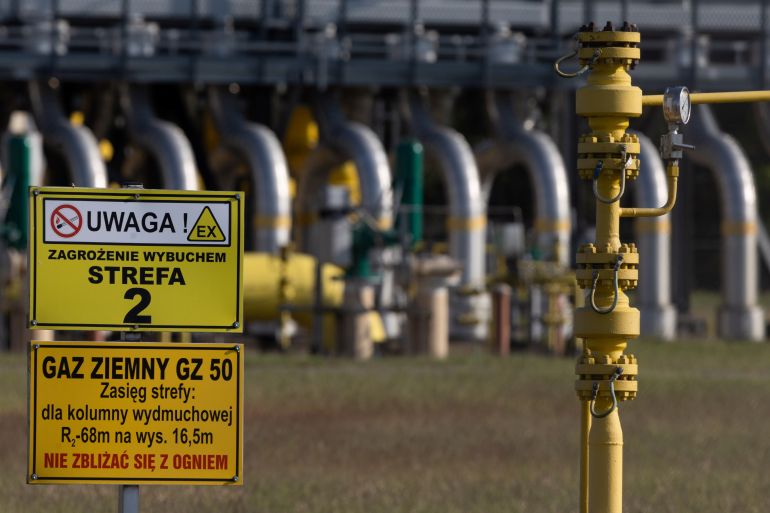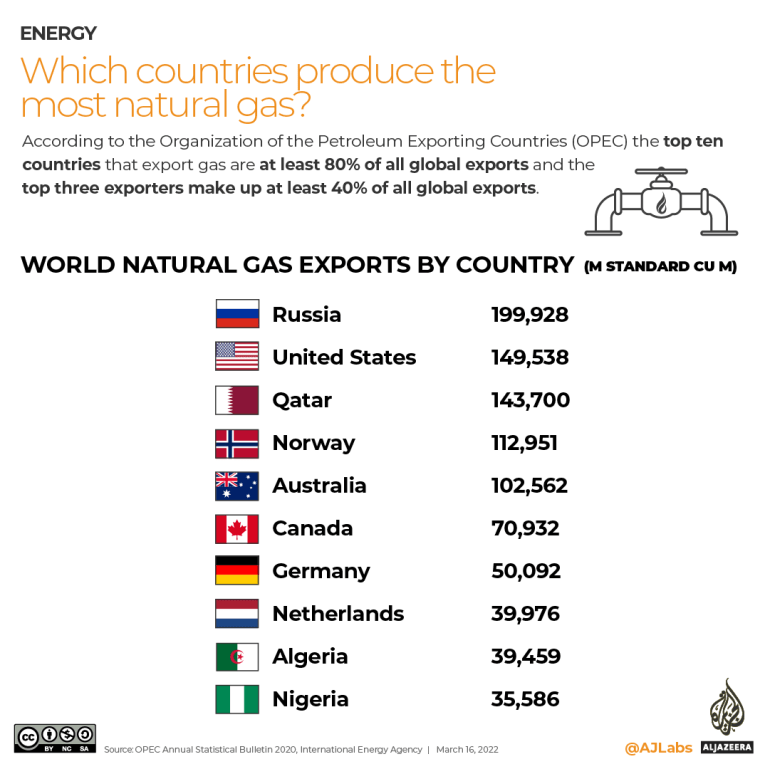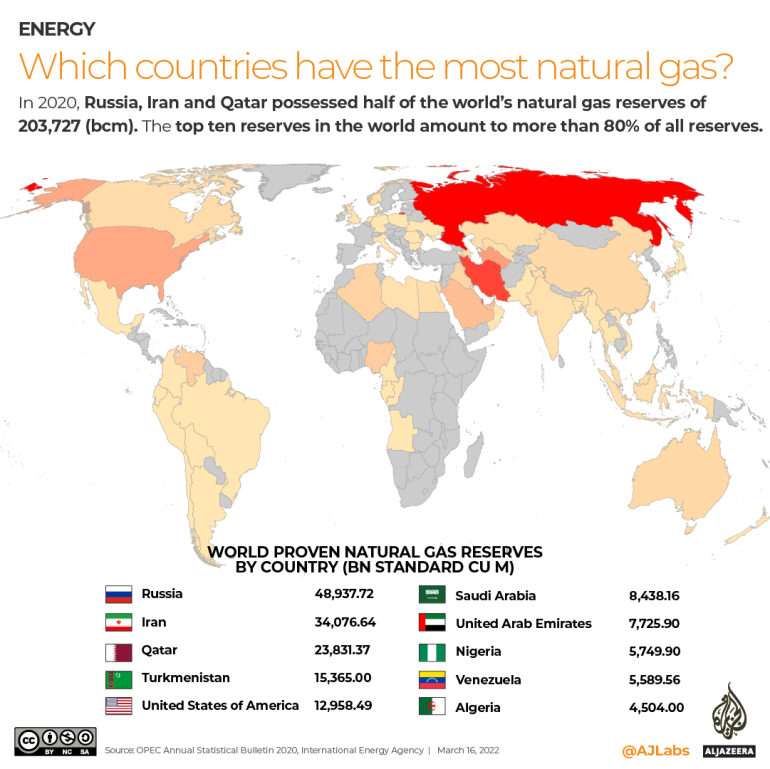What is the EU’s gas plan and does it have support of the bloc?
Bloc says rationing is necessary amid Russian ‘blackmail’ but some member states have rejected the proposal.

The European Union’s executive branch has urged member states to cut back on gas usage by 15 percent until March as fears mount that Russia may stop supplying the energy source to the bloc in the coming months.
Moscow has already curtailed exports of natural gas – used to power factories, generate electricity and heat homes – to the EU following its invasion of Ukraine in late February, as its relations with the West have deteriorated sharply.
Keep reading
list of 4 itemsInfographic: How much of your country’s gas comes from Russia?
Brussels asks EU member states to slash gas use by 15%
Russia’s Putin warns Europe gas deliveries could keep dwindling
On Tuesday, a day before the European Commission unveiled its proposal for cutbacks, Russian President Vladimir Putin warned that supplies could yet be further reduced.
The developments have come against the backdrop of volatile relations between Moscow and the EU over the latter’s political, economic and military support for Kyiv amid Russia’s offensive.
Here is what you need to know:
What has the EU proposed?
The Commission said member states should cut their gas usage by 15 percent from August to March, compared with their average consumption in the same period during 2016-2021.
Brussels could make the target mandatory if it deemed there was a substantial risk of severe shortages in the bloc – in the event of Russia turning off the taps completely, for example.
The proposal needs approval from a reinforced majority of EU countries – at least 72 percent of its 27 member states, so 19 or more ones – for it to be adopted.
It will be voted on at a meeting of the bloc’s energy ministers on July 26.
Why has the bloc put forth this plan?
The EU is acting because it is concerned that Russia may halt its gas exports to impose severe economic and political pressure on the bloc’s member states in the winter ahead, deepening an energy standoff between the two sides.
Russia has already reduced supplies significantly, cutting supplies to several member states – including Poland, Bulgaria, the Netherlands, Denmark and Finland – over their refusal to comply with the Kremlin’s demands for gas payments to be made in roubles.
It also slashed flows through its Nord Stream 1 pipeline to 40 percent of capacity last month, citing technical problems that it said were caused by sweeping Western sanctions imposed after it launched what it calls its “special military operation” in Ukraine.

The pipeline, which leads to Germany, was shut in July for 10 days in order for maintenance work to be carried out, causing supplies to Europe to plunge. It was reopened on Thursday, with flows from Russia back at the 40 percent capacity mark.
The resumption came a day after Ursula von der Leyen, the president of the European Commission, accused Russia of “blackmailing the bloc” and “using energy as a weapon”.
She warned member states that they needed to prepare for a “potential full disruption of Russian gas” and called on them to save supplies in order to quicken their filling of storage facilities in anticipation of what she said were “likely” cutbacks ahead.
“This is a big ask for the whole of the EU – but it is necessary to protect us,” von der Leyen told a news conference in Brussels on Wednesday.
Russia is using gas as a weapon.
We have to address our energy security at EU level.
We learnt from the pandemic that if we act in unity, we can address any crisis.
So let's act together to reduce gas use and provide a safety net for all EU countries. https://t.co/Or53o1Acer
— Ursula von der Leyen (@vonderleyen) July 20, 2022
How has the EU’s plan been received by member states?
Despite the ongoing uncertainty over supplies from Russia, several EU countries have expressed their opposition to the bloc’s proposal for cutbacks in gas usage.
Poland and Spain came out against the plan within 24 hours of it being put forward.
Spanish Energy Minister Teresa Ribera said on Wednesday her country would not back the proposal as it does not depend on Russian gas.
Ribera’s Portuguese counterpart, Joao Galamba, said on Thursday his government was also “totally against” the rationing.
He told Portugal’s Expresso newspaper that the EU proposal did not address the specific hydropower needs of Spain and Portugal, which due to a current drought were being forced to produce more electricity through gas-fired plants.
“The European Commission’s proposal … does not take into account the differences between countries,” Galamba said, adding that the Iberian peninsula, which does not depend on gas piped from Russia, remains an energy “island” with little energy interconnection with the rest of Europe.

A spokesman for Greece’s government said on Thursday that Athens also opposes the plan after the country unveiled a contingency plan which sees rotating power outages as a last resort if Russian gas supplies are disrupted.
These emergency measures will be activated only if other actions, including ramping up coal-fired power capacity, asking consumers to reduce power consumption at peak hours and stopping power exports, prove insufficient, Greece’s energy regulator said.
The EU’s proposal is also expected to face resistance from other member countries including Poland, which has filled its gas storage facilities to 98 percent of capacity, and Hungary, which is heavily reliant on Russian energy imports.
However, several other countries such as Denmark, Austria, Italy, Sweden and Germany have all activated emergency plans that could ultimately lead to gas rationing, indicating they may back the plan.
Meanwhile, many European leaders have been chasing alternative gas supplies, turning to the likes of the United States, Qatar, Algeria, Azerbaijan and the United Arab Emirates in recent weeks.
What has Russia said?
Moscow is yet to comment specifically on the EU’s plan but has repeatedly maintained it is a reliable energy supplier and blames Western sanctions for reduced flows to its European buyers.
On Thursday, Kremlin spokesman Dmitry Peskov refuted von der Leyen’s accusations of gas blackmail and said any “technological difficulties” concerning Russia’s gas supply to European buyers had been caused by sanctions imposed by the EU and its member states.
Russia supplied Europe with about 40 percent of its natural gas last year, with Germany being the continent’s largest importer in 2020, followed by Italy.
Its moves to restrict supplies have come as EU member states battle soaring inflation rates, with consumers having less to spend as energy prices rise and the overall cost of living rockets.
Any complete cutoff of gas would deal an even heavier blow to already troubled economies struggling to bounce back from the economic devastation unleashed by the COVID-19 pandemic.

On Monday, the International Energy Agency (IEA) warned the EU to prepare for the worst, despite Russia’s assurances over its reliability.
“Europe is now forced to operate in a constant state of uncertainty over Russian gas supplies, and we can’t rule out a complete cut-off,” IEA Executive Director Fatih Birol said.
“European leaders need to be preparing for this possibility now to avoid the potential damage that would result from a disjointed and destabilising response,” he added.
“This winter could become a historic test of European solidarity – one it cannot afford to fail – with implications far beyond the energy sector.”
On Tuesday, the International Monetary Fund also warned that “the partial shutoff of gas deliveries is already affecting European growth, and a full shutdown could be substantially more severe”.
It said that gross domestic product in member states such as Hungary, Slovakia and the Czech Republic could shrink by up to 6 percent, adding that Italy “would also face significant impacts due to its high reliance on gas in electricity production”.